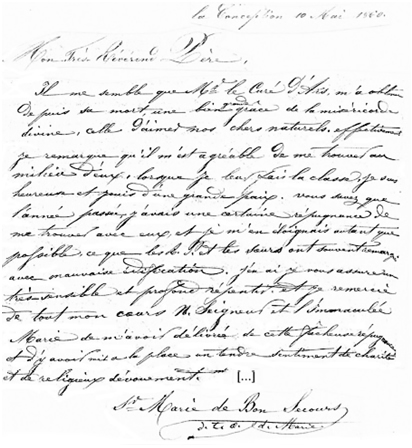24/03/2025
Deceased Sister: Sr. Julienne Santos
16/03/2025
Deceased Sister: Sr. Paula Mary Hills
06/03/2025
Prayer Intentions of the Pope
06/03/2025
Needs of the Church, the Congregation and the world
06/03/2025
Prayer Intentions of the Pope
27/02/2025
Deceased Sister: Sister Marie Jeanne Coadou
27/02/2025
Deceased Sister: Sr. M. Lena Temponi (Caterina Temponi)






Our pioneers | The Vocation of the Pioneers
 Before coming to Oceania, Marie de Bon Secours had lived as a Daughter of Charity of St Vincent de Paul, having made profession there in 1842. She left the institute in 1855. Her assignments had included working as a nurse in Turkey and Egypt. At almost forty years of age, she wanted to make reparation for her “rash impulse” to leave, and offered herself for the missions of Oceania. With Srs Marie de la Croix and Marie de la Paix she was sent to New Caledonia arriving there in December 1858.
Before coming to Oceania, Marie de Bon Secours had lived as a Daughter of Charity of St Vincent de Paul, having made profession there in 1842. She left the institute in 1855. Her assignments had included working as a nurse in Turkey and Egypt. At almost forty years of age, she wanted to make reparation for her “rash impulse” to leave, and offered herself for the missions of Oceania. With Srs Marie de la Croix and Marie de la Paix she was sent to New Caledonia arriving there in December 1858.
She was described by Fr Favre as “headstrong”; Fr Yardin acknowledged she was “well educated”, “had a facility for learning languages”, and knew “a great deal about medicine and surgery”. She brought a wealth of experience to her missionary work in New Caledonia, as well as goodwill and generosity. Adaptation was difficult. To her great regret, she did not do much nursing despite her training and experience. She was asked to teach which, she says: “I didn’t like” (cf. Bon Secours-Poupinel, 28.03.1860, Letter 16, §5, OPS I, 1860). However, at La Conception she taught 70 men to read, write and sing French hymns - very successfully, according to Fr Rougeyron (cf. Rougeyron-Favre, July-Aug. 1860, OPS I, 195); she had 100 men students in the Ise des Pins! She seems to have got on well with young and old.
Marie de Bon Secours served in many missions, not being too long in any of them. Sometimes she asked for the change; sometimes the priests asked for her to be changed. Her companions found her difficult in community but there are also testimonies to her ‘conversions’ (cf. Vigouroux-Yardin, 04.07.1863, OPS II, 313; Rougeyron-Favre, 20.10.1865, OPS II, 397). No doubt, she called forth in others a more gratuitous love. In September 1868 she volunteered for a new foundation in Ouvea (an offshore island), but the task was too much for her nor was there any money for her support. She left there in 1869; in 1871 she set out again for the Ile des Pins. There she cared compassionately for the girls from Maré (another offshore island) from where Catholics were driven out by the threats of the Protestants.
Having tasted religious life as a Daughter of Charity before coming to Oceania, Marie de Bon Secours longed for the day when the TOMMO would be organised as a fully religious congregation. In several letters she expresses the“ardent desire to give myself irrevocably to God by taking perpetual vows of poverty, chastity and obedience” (Bon Secours-Favre, 01.08.1864, Letter 33, §3, OPS II, 341). She had asked several times to make a novitiate in the congregation of Our Lady of the Missions, but her application for admission was never accepted.
Frequently in her letters she refers to Mary, often under the title of Mary Immaculate, and she desires to be her “true daughter”. Her last years were spent in St Louis, not far from Nouméa. Marie de Bon Secours had traversed the well-travelled road of the Cross, through many difficulties and sufferings. Before leaving for New Caledonia, she says she had been told by the saintly Curé of Ars, her cousin, that “she would suffer there … but she would do much good” (Bon Secours-Poupinel, 01.07.1877, Letter 58, §3, OPS IV, 688).

It seems to me that since his death the Cure of Ars has obtained for me from the divine mercy a very great grace: that of loving our dear local people. Actually, I find now that it is very pleasant for me to be with them. When taking them for class I am happy to be there and I enjoy a deep peace. You know that last year I had a certain aversion to being with them and I was distancing myself from them as much as I could to the disedification of the Rev. Father and the Sisters who often pointed it out to me. I can assure you I have had a very real and profound conversion. With all my heart I thank Our Lord and the Immaculate Mary to have freed me from this regrettable repugnance and to have given me in its place a real feeling of love and religious dedication. […] (Bon Secours-Poupinel, 10.05.1860*).